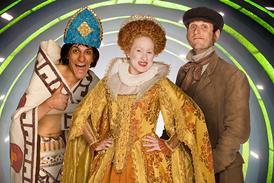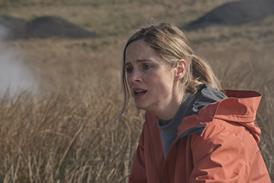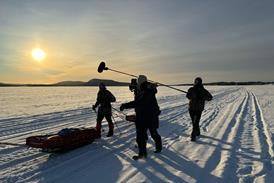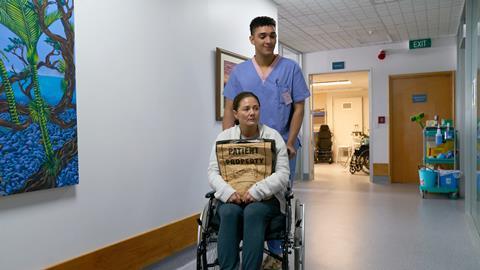‘It’s a very warm and humane gang comedy with a group of friends unlike any other you’ve seen’
Distributor Hat Trick International
Producer Great Southern Television
Length 6 x 30 minutes
Broadcaster Sky Open (New Zealand)
It’s an arresting opening scene: a woman in a bath suddenly finds she cannot move; her daughter tries to wrestle her out before attempting to pull her dad away from the telly long enough to help her. Tessa Rivers then pleads to herself: “Don’t die in the bath. Or naked.”
This combination of human drama and deadpan comedy sets the tone nicely for Spinal Destination, a six-part series from New Zealand free-to-air channel Sky Open, loosely based on the experiences of its creator and director, Paula Whetu Jones.
Like Tessa, the Māori film-maker was paralysed by a sudden illness and spent time in a spinal unit. The daily diary she kept there, detailing her experiences and the people she met, became a rich seam to mine for comedy and pathos, and to reframe audiences’ expectations about disability.
With shades of One Flew Over The Cuckoo’s Nest, much of the comedy comes from the rebellious attempts of Tessa (Shortland Street and Sweet Tooth actor Bree Peters) to stage bids for freedom as she shuns the advice of eccentric psychologist Dr Todd Taniwha in her resolve to walk again. Her plans to fix herself are intruded on by the demands of her family and – in a novel device – by ‘Walking Tessa’, a manifestation of her hyper-critical, pre-paralysed inner voice that only she can see.
“Just because we are in a wheelchair, doesn’t mean we don’t love, hate, cry, get angry, get upset, get jealous, laugh or find joy,” says Whetu Jones. “We go through the same emotions and go about our lives in many of the same ways other people do.”
An international third-party comedy has to be really special for Hat Trick International to pick it up, acknowledges director of sales Sarah Tong. “Because it’s our heartland, we get offered a lot of comedy, but it can be hard to sell, because humour is a matter of personal taste.”
A great admirer of the pedigree of its producer, New Zealand indie Great Southern Television (Agent Anna; The Basement), Tong was smitten by the authenticity of Whetu Jones’ script and cast, both in terms of disability and its Māori representation, which has been supported by domestic content funder NZ On Air. “It’s a very warm and humane gang comedy with a group of friends unlike any other you’ve seen,” she says.
The way in which Tessa becomes wheelchair-bound also conveys directly how this is something that can happen to anyone, Tong adds. “Whetu Jones captures all the usual highs and lows of everyday life – for people who just happen not to be able to walk.”
Tong says Whetu Jones has pulled off the holy grail of finding the universal in the specific. She sees Tessa’s story resonating with audiences worldwide, particularly in those markets where there has already been a kind of cultural exchange happening – the UK has become accustomed to the deadpan comedy of Flight Of The Conchords and What We Do In The Shadows, while New Zealand has developed a taste for the strong British and Irish flavours of Hat Trick’s Outnumbered and Derry Girls.
International scripted

The Count Of Monte Cristo; Austin; Borderline; Conflict; Monsieur Spade; Paris Has Fallen; Rebus; Samber; So Long, Marianne; Spinal Destination
- 1
- 2
- 3
- 4
- 5
- 6
- 7
- 8
- 9
 Currently
reading
Currently
reading
Hot Picks: Spinal Destination

















































No comments yet